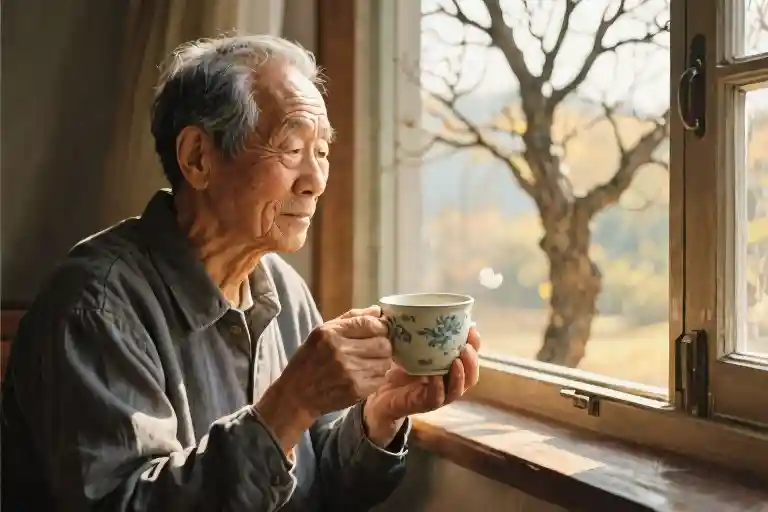The alarm goes off for the third time, and your hand moves mechanically to silence it while the rest of you remains welded to the mattress. There’s a peculiar disconnect between your body going through the motions and your consciousness still submerged somewhere beneath the sheets. You stare at the ceiling cracks you’ve memorized by now, watching the morning light creep across their jagged patterns, wishing you could press pause on time just long enough for your lungs to remember how to expand fully.
This is how emotional pain often arrives—not with dramatic collapses, but through these quiet moments of suspension where even basic functions feel like operating heavy machinery. The weight isn’t physical, yet your chest carries this palpable pressure, as if someone stacked dictionaries over your sternum overnight. You catalog the symptoms: the cottonmouth dryness, the grit behind your eyelids from another night of fractured sleep, that vague but persistent ache behind your ribs that defies medical explanation.
What’s most disorienting isn’t the sadness itself, but not being able to trace its origin. There’s no clean narrative of heartbreak or failure to point to, just this free-floating anguish that tints everything gray. You scroll through possible culprits in your mind—work stress? Social isolation? Existential dread?—but the puzzle pieces refuse to form a coherent picture. The uncertainty feeds back into the pain, creating a loop where not understanding why you hurt becomes its own source of hurt.
Meanwhile, the world outside your blanket fortress carries on with unbearable normalcy. Birds chirp their morning routines, neighbors clatter dishes in kitchen sinks, the coffee machine gurgles its familiar song—all these sounds that should feel comforting instead highlight how removed you’ve become from simple pleasures. The chasm between external reality and internal experience yawns wider each day, making you wonder if anyone else feels this fundamental disconnect beneath their polished Instagram smiles.
Here’s what they don’t tell you about invisible struggles: the loneliness isn’t just about being physically alone, but about carrying experiences that feel too nebulous to articulate. How do you explain that brushing your teeth this morning required Herculean effort? That putting on socks felt like solving advanced calculus? That you cried over a commercial not because it was sad, but because existing suddenly seemed like too much work? These micro-collapses don’t translate well into lunchroom conversations or therapy sessions, so you learn to shorthand them into “I’m fine” and “Just tired.”
But this chapter isn’t about the weight—it’s about the fact that despite its crushing presence, you’re still breathing. However shallow those breaths may be right now, however much each one costs you, they’re proof of a quiet resilience even you don’t fully recognize yet. The very act of reading these words means part of you still believes in morning light, still trusts that seasons change, even when winter seems endless.
The Invisible Weight You Carry
The alarm goes off. Your hand reaches out to silence it on autopilot, but something heavier than sleep keeps your spirit pressed into the mattress. You count ceiling cracks with dry eyes, performing the morning ritual of existing without truly being present. This is how emotional pain operates – an invisible gravity that turns ordinary acts into extraordinary feats of endurance.
The Performance of Okayness
You’ve mastered the subtle art of functional distress. At work, you deploy the ‘concentrated frown’ that passes for professional focus. With friends, you’ve perfected the delayed laugh – that half-second pause before responding to jokes to ensure proper emotional timing. These micro-adjustments form your emotional labor spreadsheet, where every interaction requires careful calculation of:
- Appropriate smile intensity (30% for colleagues, 60% for acquaintances)
- Acceptable complaint thresholds (1 minor gripe per 3 positive remarks)
- Conversational bailout points (“Oh look at the time!”)
The cruel irony? The better you perform normality, the more isolated you become in your suffering. When you’re finally alone, the mask slips with physical suddenness – shoulders collapsing like a marionette with cut strings, breath escaping in a shudder you didn’t know you’d been holding.
Microscopic Collapses
Emotional pain has its own physics. It concentrates in mundane moments with terrible precision:
- Toothpaste tragedies: That sudden sting when mint foam hits your lips and you’re inexplicably weeping into the sink
- Dishwater dissociations: Hands moving through warm suds while your mind floats somewhere beyond the kitchen tiles
- Commute catastrophes: Missing your stop because you’ve been staring at the same passing tree for twelve minutes
These aren’t breakdowns – they’re pressure releases. Your body’s intelligent rebellion against the unsustainable weight you’ve been carrying. That single tear rolling down during a Zoom meeting? That’s not weakness leaking out. It’s proof you’re still alive beneath the numbness.
Midnight Debates With Shadows
Insomnia transforms bedrooms into courtrooms. You lie motionless as your mind prosecutes past versions of yourself:
“Why did you say that thing in 2017?”
“You should have left when you had the chance.”
“Everyone notices how tired you look.”
The pillow becomes both witness and jury. You check the clock – 2:17 AM – and realize you’ve been having the same argument with yourself for 53 minutes. This is the paradox of nighttime pain: the world sleeps while your wounds stay wide awake.
Yet even here, in this endless dark, there’s evidence of your quiet resilience. The simple fact that you’re still listening to these thoughts means part of you still cares. The exhausted, battered part that keeps showing up to these involuntary midnight sessions? That’s not a failure – that’s your stubborn, beautiful refusal to completely let go.
The Hidden Acts of Survival
You’re accomplishing more than you realize. Every time you:
- Wash one dish instead of the whole pile
- Answer “How are you?” without screaming
- Change out of pajamas at 3 PM
…you’re performing emotional algebra, solving for X when X equals getting through today. These aren’t small things – they’re the invisible labor of staying alive when your mind feels like hostile territory.
Your pain might be invisible, but so is your strength. The weight you carry has shaped muscles you can’t see yet – the kind that will one day help you bear joy with the same depth you now bear sorrow.
The Survivor’s Paradox
You reply to that text message. You show up to work. You manage to wash your hair. These don’t feel like victories—they feel like the bare minimum, the mechanical motions of existing rather than living. But here’s the secret your exhaustion won’t let you see: every time you perform these tiny acts of survival, you’re waging a silent war against the weight pressing down on your chest.
The invisible battles leave no medals. Nobody congratulates you for getting through a grocery store trip without crying in the frozen food aisle. There’s no applause for swallowing back tears during a Zoom meeting. Yet these uncelebrated moments contain more courage than any dramatic gesture ever could. Your fingers still typing emails, your legs still carrying you home—these aren’t failures to thrive, but proof of your stubborn refusal to be completely overtaken.
Science actually confirms what your guilt tries to deny: those sudden tears at your desk or in the shower serve a biological purpose. Emotional tears contain stress hormones like ACTH and enkephalin—your body literally pushing out the chemicals of overwhelm. When you weep without obvious reason, it’s not weakness malfunctioning; it’s your physiology performing emergency maintenance. The same way sweat cools an overheated body, tears regulate an overtaxed nervous system.
Three times today, without realizing it, you proved the survivor’s paradox true:
- When you silenced your alarm instead of disabling it completely
- When you drank water even though nothing tasted good
- When you texted back “I’m okay” because giving the real answer felt too exhausting
Each was a quiet act of rebellion against the part of you that whispered “why bother?” The math of depression always lies—it counts only the collapsed moments, never the thousands of times you didn’t. But here’s the equation that matters: you’re still here. After all the nights the darkness promised it would swallow you whole, after all the mornings your bones felt filled with wet sand—you’re still here.
This paradox hides in plain sight: the very vulnerability you judge yourself for contains your strength. The tears you wipe away quickly in bathroom stalls? They’re evidence of your sensitivity’s survival, not its failure. The fact you can still be wounded means you haven’t completely armored over. That lingering capacity to feel—even when it hurts—is the same raw material that will eventually let you feel joy again with the same intensity you now feel pain.
No one documents these micro-victories. There’s no journal entry for “didn’t cancel plans today” or “ate three meals anyway.” But these unrecorded triumphs form the safety net that keeps you from total freefall. The next time guilt whispers “you’re not trying hard enough,” counter with this truth: trying looks different when you’re carrying invisible weights. Simply standing under the load is its own kind of effort.
You’ve already mastered the hardest lesson without realizing it—how to keep breathing while drowning. Now comes the gentler truth: the same instincts that kept you afloat can teach you to swim again. Those survival mechanisms you dismiss as automatic? They’re the foundation being laid for whatever comes after survival.
Seasonal Emotions: The Time Capsule of Pain
There’s something quietly radical about writing a letter to your future self during moments of emotional pain. Not the polished, motivational kind you might find in self-help books, but the raw, ink-blotted version where your handwriting wobbles from crying. This isn’t about manifesting some perfect future—it’s about creating a psychological time capsule that preserves your present ache while leaving space for the person who’ll eventually open it.
The Alchemy of Future Perspective
When pain feels endless, our minds lose the ability to imagine its cessation. Neuroscience explains this as the brain’s threat response narrowing our temporal perception—essentially putting us in emotional survival mode where past, present and future collapse into one unbearable now. Breaking this cognitive trap requires what therapists call ‘time expansion’, and there’s no simpler tool than a letter addressed: To Me, When This Makes Sense.
Consider documenting:
- The exact texture of your pain (is it a dull throb behind your eyes? A metallic taste of panic?)
- Three mundane things you’re still doing despite everything (maybe watering plants with tears in your eyes)
- One question you’re afraid to voice (“Will I ever feel light again?”)
The magic lies not in the writing, but in the inevitable rediscovery months later when you stumble upon it while cleaning your desk. That moment of realizing I survived what once felt unsurvivable becomes tangible proof of your resilience. One of my therapy clients keeps hers in a cookie tin labeled Emotional Rainy Day Fund—she’s added twelve letters over five years, each a fossil of pain that eventually birthed unexpected strength.
Post-Traumatic Growth in Disguise
We often miss our own emotional evolution because it happens in microscopic increments. Like tree rings marking years of drought and abundance, our psyche develops invisible competencies through hardship:
- Hyper-empathy: The ability to detect subtle shifts in others’ energy from years of masking your own pain
- Emotional granularity: That uncanny precision in naming feelings (“This isn’t anxiety—it’s the specific dread of abandoned potential”)
- Shadow resilience: Automatic self-protection habits formed during dark periods (like your body refusing coffee when cortisol spikes)
These aren’t the shiny ‘lessons’ people prematurely insist you find in suffering. They’re more like psychological calluses—invisible at first, until you notice your grip on life has grown steadier where it once blistered.
The Non-Linear Art of Healing
Healing moves in spirals, not straight lines. Some days you’ll feel decades beyond the pain, until the scent of a stranger’s perfume or a particular shade of twilight drops you back into memory. This isn’t regression—it’s your psyche’s way of revisiting old wounds with new resources.
Think of it like tree rings: each circle contains both the original injury and every subsequent layer of growth that grew around it. The wound never disappears, but becomes a smaller percentage of the whole. That’s why anniversaries of loss can feel simultaneously less raw yet more poignant—you’re not just remembering the pain, but all the life that grew in its wake.
Tonight, if sleep eludes you again, try this instead of counting sheep: imagine your future self holding this moment like a smoothed stone in their palm. Not as something to fix or fear, but as one dark vein in the marble of who you’re becoming. The stone stays, but the hand holding it grows steadier, warmer, more capable of turning it to catch the light.
When Breathing Is Enough
Your phone buzzes with reminders you ignore. The to-do list grows longer, but right now, lifting your head from the pillow requires the kind of effort usually reserved for moving mountains. So today, let’s rewrite the rules. Your only assignment: inhale. Exhale. Repeat.
This isn’t surrender—it’s strategic retreat. Like trees conserving energy in winter, you’re practicing the art of minimum viable survival. That meeting you canceled? The unwashed dishes? They’ll keep. What won’t keep is you, if you don’t press pause.
I once spent thirty-seven minutes staring at a single raindrop sliding down my window, counting each heartbeat like it was proof I still existed. Some days, that’s the victory—not productivity, not progress, just presence. Your lungs rising and falling beneath the weight is its own kind of rebellion against the darkness.
Here’s what nobody tells you about emotional pain: it alters your body chemistry. Those sudden tears while chopping onions? Science confirms they contain stress hormones—your physiology literally shedding what your mind can’t process. So when you whisper “I can’t” through clenched teeth, remember your cells are already working to expel the poison.
You don’t need grand gestures today. No vision boards or gratitude journals required. Just:
- Breathe in through your nose (count to four)
- Hold (count to seven)
- Exhale through pursed lips (count to eight)
Repeat until the microwave beep sounds less like an air raid siren. Until the neighbor’s laughter stops feeling like personal mockery. This ancient rhythm—inhale, hold, release—is your birthright and your lifeline.
That critical voice hissing “you should be over this by now”? Mute it with this truth: healing isn’t linear. Like coastline erosion, change happens in imperceptible increments. What feels like stagnation is often underground restructuring—your psyche rebuilding its foundations.
Years from now, you’ll point to this season not with shame, but quiet awe. “That,” you’ll tell someone over tea, “was when I learned to breathe underwater.” The memory will startle you—not because the pain faded (it does), but because you’ll realize how far you’ve traveled from that version of yourself who thought simply surviving wasn’t enough.
It was. It is. You are.





